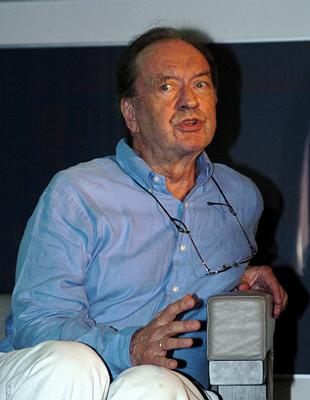|
<< -- 3 -- Tess Crebbin SYMPHONIES AND LETTERS

Harnoncourt, who radiates a disarming sense of humor, and in general seems to stand for everything that makes Austrians so endearing with their expressive and laid-back style, continues: 'All of us here have children, or at least we all have been children, I hope. So I must assume that we are all aware of what goes on inside a family. I am, certainly, being a father myself. So I would like to come out in defence of Mozart's father. Much has been made of the allegedly difficult relationship between father and son, but as someone who knows the Mozart letters very well, and often reads them, I can only see profound love and support there. I know these letters and I also happen to know what modern phone conversations between parents and children are like. In Mozart's case, we get an exaggerated picture because everything is put down in writing. So what if Leopold said to his son: be careful with your money. Don't we all do that with our children? And when he first comes home with a girl he intends to marry, isn't it parental nature to say "wait a little longer because this may not work out" ?'
Since Mozart wrote his symphonies while on the road, Harnoncourt believes that the letters also provide important background information on the history and creation of the works themselves. 'Just think of it: he used to go everywhere by coach. That means it took him three days to get from Salzburg to Vienna when now it is a mere three hours by car. In those three days he could not write or read: the roads were bumpy and you got shaken about quite a bit. But an artist like Mozart used every smallest experience for his art: the way the horse hooves sounded on the pavement, the different song of birds in various places, the different means of playing local folk music in the villages that they passed, the sound of rain hitting down on the coach roof. All these observations, as well as flowing into his music, went into the letters also. So, in a manner of speaking, we are taking you along the journeys of Mozart's life, to travel a part of the way with him.'

Nikolaus Harnoncourt at the 2004 BMG Classics Press Conference. Photo: Rudolf Budja
|
Asked whether money is a prime consideration in picking a new project, the maestro puts on his typical broad Harnoncourt smile, casts a wide-eyed look into the audience and explains: 'Art is something you don't do for the money. You do it for the sake of your love of it. Can you imagine if DaVinci, prior to setting the first stroke, had asked "yeah, but what's in it for me, and how much will I get out of royalties?" There is no money in art, let's face it. Whatever musical undertakings I engage in are for the love of it, because I believe in the project. I don't ask about percentages, I ask about the importance to music.'
Continue >>
Copyright © 12 August 2004
Tess Crebbin, Germany

|

